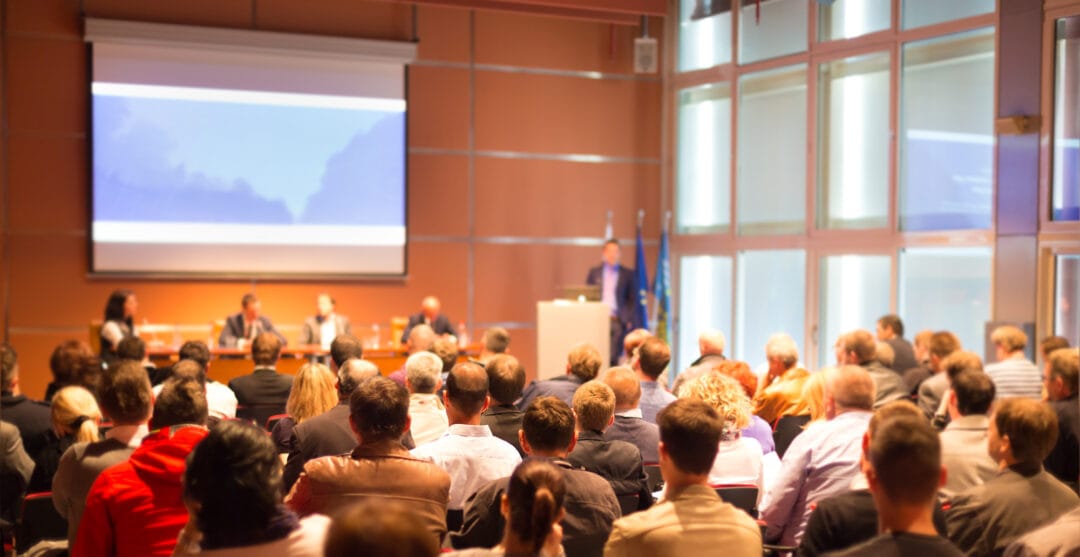Ever noticed how some conferences run like clockwork while others feel scattered and stressful? That difference usually comes down to one thing: strong conference management. Behind every smooth, professional event is a carefully coordinated mix of planning, logistics, and conference management expertise. Success relies on much more than what’s visible daily, from major industry summits to internal business gatherings.
When done well, conference management frees your team to focus on their roles, while experts handle everything from delegate engagement to AV setup. This kind of strategic support transforms a conference from just another date in the calendar to a standout business moment. As expectations grow, so does the value of having professionals who can bring your vision to life seamlessly.

What Is Conference Management?
Conference management is more than just ticking boxes on an event checklist. It involves a strategic approach to planning, coordinating, and executing a professional gathering that aligns with business goals. Every detail plays a role, from venue selection and supplier liaison to on-site support and post-event analysis.
The complexity lies in balancing logistics with creativity and structure with flexibility. A well-managed conference ensures that every element, timing, communication, branding, and staging work harmoniously. It’s not just about the day of the event. It’s about building momentum before and ensuring lasting value after. With the right expertise, what seems overwhelming becomes a streamlined and enjoyable process.
Why It’s Crucial for Corporate Events
Corporate events aren’t just about gathering people in a room; they reflect your organisation’s image and values. Poorly managed events can leave a lasting negative impression. At the same time, a well-executed conference strengthens relationships, showcases professionalism, and reinforces trust.
This is especially important when hosting clients, investors, or internal teams. A successful conference can motivate staff, generate media attention, or inspire innovation. Our Event Management Services help businesses stay in control of logistics while creating engaging, purposeful events. With professionals overseeing the process, you can focus on outcomes, knowing the experience will reflect your brand standards and values.
Delivering a Seamless Experience for Delegates
When delegates arrive, they expect a streamlined, engaging experience, not delays, confusion, or lack of direction. Successful conference planning ensures smooth check-ins, clear signage, and effortless transitions between sessions. Delegate satisfaction is directly tied to thoughtful event flow.
Details matter, from well-marked registration desks to well-timed breaks, interactive sessions, and food that meets all dietary needs. Every element should feel intentional. This is where it truly shines. With proper planning, attendees are relaxed, engaged, and ready to absorb your message, leading to higher retention and better outcomes.
Maximising Value Through Strategic Planning
Every conference should serve a purpose. Whether launching a new initiative, fostering industry collaboration, or educating your team, strategic conference planning ensures that the purpose is clear and achieved.
This requires more than logistics. It’s about aligning every element, venue, agenda, guest speakers, and branding materials with broader business goals. An effective plan includes KPIs, budgets, timelines, and communications strategies. Done well, strategic planning ensures your investment pays off not just on the day but through long-term results like stronger partnerships, enhanced brand reputation, and actionable insights.
The Pitfalls of Poor Planning
When conference management is overlooked or undervalued, things can quickly unravel. Here are a few common scenarios:
- Technical Failures: Without proper AV and technical support, presentations can crash, mics can fail, and live streams might buffer endlessly.
- Disorganised Itineraries: Poor scheduling can result in overlapping sessions, no time for breaks, or delegates missing important content.
- Unclear Roles and Communication: A lack of coordination leads to missed cues, confused suppliers, and last-minute panics.
- Overlooking Delegate Needs: Neglecting dietary requirements, accessibility, or clear signage can frustrate attendees and make them feel excluded.
- Lack of Post-Event Follow-Up: Without a system to gather feedback or provide post-event content, you miss a critical chance to improve and engage.
Even one of these issues can disrupt the delegate experience and affect your business’s reputation. Professional oversight mitigates risk, keeps teams focused, and creates an environment where success is far more likely.
The Role of Professional Organisers in Conference Success
Bringing professional organisers isn’t just about convenience; it’s a strategic investment. They bring structure, foresight, and an extensive network of trusted suppliers. With experience across various industries, they know what works and what doesn’t and how to pre-empt challenges before they escalate.
Professional event teams are adept at juggling complex logistics, managing vendors, navigating permits, and communicating clearly with stakeholders. They understand the balance between control and adaptability, allowing for a structured plan with room for real-time adjustments. This combination of experience and flexibility makes a seasoned organiser invaluable.
What also sets professionals apart is their ability to remain calm under pressure. They bring solutions, not stress, to unexpected challenges, from a last-minute speaker cancellation to a power outage or scheduling hiccups. Their presence ensures the event stays on track no matter what unfolds.
Choosing the Right Conference Venue
Venue selection is more than a checkbox; it sets the tone for the entire event. The right space supports your brand, offers flexibility, and accommodates the unique needs of your delegates. Is there adequate space for networking? Are the acoustics and lighting conference-friendly? Is the venue accessible and well-located?
Working with a Preferred Venue Partner takes the guesswork out of the equation. We evaluate everything from transport options to on-site facilities, technology availability, and nearby accommodation. A great venue not only impresses guests but also makes every delivery aspect more efficient and professional.
The Importance of Timing and Lead Times
One of the most underrated aspects of conference management is understanding lead times. Venues, keynote speakers, promotional campaigns, and suppliers require proper notice. Trying to fast-track these processes often leads to poor choices or unnecessary costs.
A rushed timeline also increases the chances of mistakes or missed opportunities. Starting 6–12 months out allows for thoughtful planning, better supplier availability, and reduced stress. A detailed, realistic timeline is the backbone of a successful conference, and experienced planners know how to build one that supports every objective.
Aligning Conference Content With Business Objectives
Content strategy is one of the most overlooked yet impactful parts of conference planning. A compelling conference isn’t just about who’s speaking; it’s about what they say and how their message aligns with your business goals.
Quality content adds value for attendees and justifies the investment in the event. Your speakers, sessions, and panels should tie directly into your goals, whether boosting sales, improving staff morale, or sharing new research. Every content decision should reinforce your objectives and offer delegates something actionable to take away.
Involving Stakeholders from the Start
A successful conference requires buy-in from attendees and stakeholders. Getting input from decision-makers early in the planning process helps align expectations, secure resources, and clarify messaging.
When stakeholders are looped in from the beginning, they’re more likely to support the event and help drive its success. They can help refine the vision, highlight potential pitfalls, and assist with budget or content approvals. Early collaboration helps eliminate surprises and ensures the event supports everyone’s interests.
Technology Integration and Hybrid Possibilities
In today’s world, no conference can afford to ignore technology. From registration platforms and mobile apps to live-streaming and virtual networking lounges, tech elevates the attendee experience and widens your reach.
Hybrid events, in particular, have transformed how businesses engage with broader audiences. Pink Caviar offers full technical support, allowing remote delegates to enjoy a seamless experience that mirrors in-person engagement. Technology also opens up more data tracking, content sharing, and accessibility options, making the experience richer for everyone involved.
Building Momentum with Pre-Event Communications
Creating excitement before a conference boosts attendance and builds engagement. Strategic pre-event communications help delegates understand the value of the event and how to prepare.
This includes registration reminders and mobile app access to spotlight key speakers and promote networking opportunities. Timely, well-crafted messages help reinforce professionalism, eliminate confusion, and increase participation. Pre-event touchpoints also signal to guests that the conference is thoughtfully organised, starting the delegate journey on a high note.
Post-Event Analysis and ROI Tracking
The end of the conference isn’t the end of the work; it’s the beginning of the review. Analysing feedback, assessing delegate engagement, and tracking outcomes are all critical to understanding your return on investment.
Professional organisers gather insights from registration trends, survey data, session attendance, and social media activity. These insights help fine-tune future events and show internal stakeholders that your conference met (or exceeded) expectations. It’s not just about the day; it’s about learning, evolving, and proving the event’s value over time.
ROI isn’t always about revenue. It can be measured through strengthened relationships, better staff engagement, or clearer brand messaging. A successful post-event analysis helps businesses understand their event investment’s tangible and intangible benefits, turning each conference into a stepping stone for future success.
Conclusion
Conference management isn’t just a nice-to-have; it’s the backbone of every successful business event. From strategy and scheduling to logistics and delegate satisfaction, it ensures your event delivers real value without the stress.
Do you want your next conference to go smoothly? Are you considering professional event coordination to make it happen? Call 1300 884 800 or email info@pinkcaviar.com.au; we’re ready to bring your vision to life.
Stephanie Cassimatis is the founder and head stylist of Pink Caviar Events, a leading corporate event management and styling company based in Sydney, Australia. With over 20 years of experience in the industry, she has built a reputation for precision, creativity, and exceptional client service. A Certified Event Manager (CEM), Project Management Professional (PMP), and Certified Colour Consultant, Stephanie brings together strategic expertise and design sensibility to deliver events that are both seamless and visually impactful. She also shares her knowledge as a speaker and educator, empowering professionals to elevate their event design and execution.



